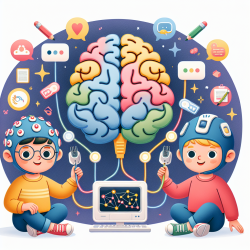Boosting Emotional Wellbeing in Kids: The Power of Organized Activities
In the realm of child development, organized activities play a pivotal role in nurturing emotional wellbeing. A recent study titled A cross-sectional study of organized activity participation and emotional wellbeing among non-immigrant and immigrant-origin children in British Columbia, Canada sheds light on the impact of these activities on children from diverse backgrounds. As a practitioner, understanding these findings can enhance your approach to supporting children's emotional health.
Understanding the Study
This study explored the relationship between organized activity participation and emotional wellbeing among Grade 7 children in British Columbia, Canada. It specifically focused on how this relationship varies between non-immigrant and immigrant-origin children. The research utilized the Middle Years Development Instrument (MDI), a self-report survey that measures children's wellbeing and assets.
Key Findings
- Participation in organized activities was similar among non-immigrant and immigrant-origin children.
- Immigrant generation status modified the relationship between participation and emotional wellbeing.
- Non-immigrant children showed beneficial associations between participation and both life satisfaction and depressive symptoms.
- For immigrant-origin children, the benefits were less pronounced, indicating a need for tailored approaches.
Implications for Practitioners
As a practitioner, these findings highlight the importance of considering the diverse backgrounds of children when promoting organized activities. Here are some strategies to enhance your practice:
- Promote Inclusivity: Ensure that organized activities are inclusive and culturally sensitive to accommodate children from various backgrounds.
- Tailor Activities: Recognize that immigrant-origin children may face unique challenges. Tailor activities to address language barriers and cultural differences.
- Foster Peer Belonging: Encourage peer connections within activities to enhance feelings of belonging, which is crucial for emotional wellbeing.
- Engage Families: Involve families in the planning and execution of activities to ensure they align with cultural values and expectations.
Encouraging Further Research
While this study provides valuable insights, it also opens the door for further research. Practitioners can contribute by exploring the following areas:
- Investigate the specific barriers immigrant-origin children face in participating in organized activities.
- Examine the long-term impact of organized activities on emotional wellbeing across different cultural contexts.
- Explore the role of peer relationships in enhancing the benefits of organized activities.
By delving deeper into these areas, practitioners can develop more effective strategies to support all children's emotional wellbeing through organized activities.
To read the original research paper, please follow this link: A cross-sectional study of organized activity participation and emotional wellbeing among non-immigrant and immigrant-origin children in British Columbia, Canada.










